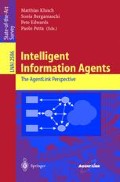Abstract
Modern ACLs, such as FIPA ACL, provide standardised catalogues of performatives and protocols, designed as general purpose languages to ensure interoperability among agent systems. However, recent work reports a need for new ad-hoc sets of performatives and protocols in certain contexts, showing that FIPA ACL does not support adequately all relevant types of interactions. In this paper we first present a formal model that relates performatives and protocols to the organisation of MAS. Then, a principled method for the design of the ACL of a particular MAS is developed, which accounts for both, reusability and expressiveness. Finally, we illustrate our approach by an example in the domain of agent-based decision support for bus fleet management.
Research sponsored by MCyT, project TIC2000-1370-C04-01, and by CAM, project 07T/0011/2000
Access this chapter
Tax calculation will be finalised at checkout
Purchases are for personal use only
Preview
Unable to display preview. Download preview PDF.
References
J. L Austin. How to do Things with Words. Clarendom Press, Oxford, 1962.
Jeffrey M. Bradshaw, Stewart Dutfield, Pete Benoit, and John D. Woolley. KAoS: Toward an industrial-strength open agent architecture. In Jeffrey M. Bradshaw, editor, Software Agents, chapter 17, pages 375–418. AAAI Press / The MIT Press, 1997.
Philip R. Cohen and Hector J. Levesque. Intention is choice with commitment. Artificial Intelligence, AI, 42(2–3):213–261, March 1990.
Frank Dignum, Barbara Dunin-Keplicz, and Rineke Verbrugge. Creating collective intention through dialogue. J. of the IGPL, 9(2):305–319, 2001.
M. Esteva, J. A. Rodriguez, C. Sierra, P. Garcia, and J. L. Arcos. On the formal specifications of electronic institutions. In F. Dignum and C. Sierra, editors, Agent-mediated Electronic Commerce (The European AgentLink Perspective), volume 1191 of LNAI, pages 126–147, Berlin, 2001. Springer.
J. Ferber and O. Gutknetch. A meta-model for the analysis of organizations in multi-agent systems. In Y. Demazeau, editor, ICMAS’98, pages 128–135. IEEE Press, 1998.
Jacques Ferber, Olivier Gutknecht, Catholijn M. Jonker, Jean-Pierre Müller, and Jan Treur. Organization models and behavioural requirements specification for multi-agent systems. In Proc. of the ECAI 2000 Workshop on Modelling Artificial Societies and Hybrid Organizations, 2000.
Foundation for Intelligent Physical Agents. FIPA Communicative Act Library Specification. http://www.fipa.org/specs/fipa00037, 2000.
Foundation for Intelligent Physical Agents. FIPA SL Content Language Specification. http://www.fipa.org/specs/fipa00008/XC00008D.html, 2000.
Georg Gottlob, Michael Schrefl, and Brigitte Röck. Extending object-oriented systems with roles. ACM Transactions on Information Systems, 14:268–296, 1996.
J. Hernandez, S. Ossowski, and A. Garcia-Serrano. Multiagent architectures for intelligent traffic management systems. Transportation Reaserch (Part C), 10, 2002.
Kazuhiro Kuwabara, Toru Ishida, and Nobuyasu Osato. Agentalk: Coordination protocol description for multiagent systems. In Victor Lesser, editor, Proceedings of the First International Conference on Multi-Agent Systems, page 455, San Francisco, CA, 1995. MIT Press.
S. Ossowski and J. M. Serrano. Towards agent-based architectures for advanced decision support. In Proceedings of the Second Iberian Workshop on Physical Agents (WAF), 2001.
H. Van Dyke Parunak and J. Odell. Representing social structures in UML. In J. P. Müller, E. Andre, S. Sen, and C. Frasson, editors, Proceedings of the Fifth International Conference on Autonomous Agents, pages 100–101, Montreal, Canada, May 2001. ACM Press.
B. Pernici. Objects with roles. In Proc. of the Conference on Office Information Systems, pages 205–215, Cambridge, MA, 1990.
J. Pitt and A. Mamdani. Designing agent communication languages for multi-agent systems. Lecture Notes in Computer Science, 1647:102–114, 1999.
James Rumbaugh, Ivar Jacobson, and Grady Booch. The Unified Modeling Language Reference Manual. Addison-Wesley, 1999.
M. D. Sadek. Dialogue acts are rational plans. In Proceedings of the ESCA/ETRW Workshop on the structure of multimodal dialogue, pages 1–29, Maratea, Italy, 1991.
M. D. Sadek. A study in the logic of intention. In William Nebel, Bernhard; Rich, Charles; Swartout, editor, Proceedings of the 3rd International Conference on Principles of Knowledge Representation and Reasoning, pages 462–476, Cambridge, MA, October 1992. Morgan Kaufmann.
M. D. Sadek. A study in the logic of intention. In William Nebel, Bernhard; Rich, Charles; Swartout, editor, Proceedings of the 3rd International Conference on Principles of Knowledge Representation and Reasoning, pages 462–476, Cambridge, MA, October 1992. Morgan Kaufmann.
J. R Searle. Speech Acts. Cambridge University Press, 1969.
J. R. Searle and D. Vanderveken. Foundations of illocutionary logic. Cambridge University Press, 1985.
J. M. Serrano and S. Ossowski. Domain extensions to the FIPA-ACL: an application to decision support systems. In SEID-2000, pages 1–14. University of Vigo, 2000.
J. M. Serrano and S. Ossowski. The design of communicative act libraries: a linguistic perspective. Applied Artificial Intelligence, In Press, 2002.
J. M. Serrano and S. Ossowski. The design of interaction protocols: an organizational approach. In Proceedings of the Agent Communication Language and Conversation Policies Workshop, 2002.
C. Sierra, N. R. Jennings, P. Noriega, and S. Parsons. A framework for argumentation-based negotiation. LNCS, 1365:177–193, 1998.
Teun A. van Dijk. Discourse as Social Interaction. SAGE Publications, 1995.
A. Wierzbicka. A semantic metalanguage for a crosscultural comparison of speech acts and speech genres. Language and Society, 14:491–513, 1985.
A. Wierzbicka. English speech act verbs. A semantic dictionary. Academic Press, Australia, 1987.
Ludwig Wittgenstein. Philosophical Investigations. Macmillan, London, 1953.
Michael Wooldridge, Nicholas R. Jennings, and David Kinny. The gaia methodology for agent-oriented analysis and design. Autonomous Agents and Multi-Agent Systems, 3(3):285–312, September 2000.
Franco Zambonelli, Nicholas R. Jennings, and Michael Wooldridge. Organizational abstractions for the analysis and design of multi-agent systems. In Paolo Ciancarini and Michael J. Wooldridge, editors, AOSE, volume 1957 of LNCS, pages 235–252. Springer, 2000.
Author information
Authors and Affiliations
Editor information
Editors and Affiliations
Rights and permissions
Copyright information
© 2003 Springer-Verlag Berlin Heidelberg
About this chapter
Cite this chapter
Manuel Serrano, J., Ossowski, S., Fernández, A. (2003). The Pragmatics of Software Agents: Analysis and Design of Agent Communication Languages. In: Klusch, M., Bergamaschi, S., Edwards, P., Petta, P. (eds) Intelligent Information Agents. Lecture Notes in Computer Science(), vol 2586. Springer, Berlin, Heidelberg. https://doi.org/10.1007/3-540-36561-3_11
Download citation
DOI: https://doi.org/10.1007/3-540-36561-3_11
Published:
Publisher Name: Springer, Berlin, Heidelberg
Print ISBN: 978-3-540-00759-3
Online ISBN: 978-3-540-36561-7
eBook Packages: Springer Book Archive

